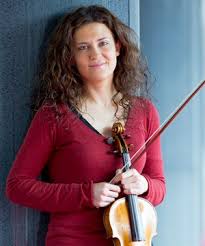 Last week I interviewed Lorenza Borrani, leader of the Chamber Orchestra of Europe and co-founder of Spira Mirabilis. Yesterday I heard her play. It was a bit good*.
Last week I interviewed Lorenza Borrani, leader of the Chamber Orchestra of Europe and co-founder of Spira Mirabilis. Yesterday I heard her play. It was a bit good*.
Borrani is in Australia as guest leader of the Australian Chamber Orchestra, filling in for artistic director Richard Tognetti, who is resident at the Barbican Centre in London this month. With them she does a national tour of “Beethoven’s Favourite”, a program including his String Quartet in C-Sharp minor, Op. 131 in a string ensemble arrangement.
The program opened with Borrani as soloist in Schnittke’s Sonata for Violin and Chamber Orchestra (1968). Schnittke, who at the time of writing was a member of the Union of Composers in the former Soviet Union, wrote this work in the state-required serial idiom. Theoretically. Apparently the tone rows are there if you want to do a structural analysis, but they are completely upstaged by the kaleidoscope of lush chords, soulful lines, spiky rhythms, fascinating timbres and, above all, a sense of serious play. A great match, then, for this questing soloist and her willing band. Notwithstanding the fact that her shoulder rest fell off just before the final cadenza, Borrani  gave it a gripping performance** — the kind of performance where you forget she’s playing the violin or, for that matter, that you are listening to the ACO, and just get lost in listening.
gave it a gripping performance** — the kind of performance where you forget she’s playing the violin or, for that matter, that you are listening to the ACO, and just get lost in listening.
The Beethoven is the culmination of the ACO’s year long exploration of his late quartets. A long and strange journey which has brought them to a very special place. From the opening phrase — on one violin, then many, then on viola, cello, and bass… — they projected an intense and coherent vision. I’m not just talking about well-matched articulation and phrasing, or tight ensemble. And I’m also not talking about playing as one: the sound was rich and full of complexity, a collection of individuals. What impressed me was the singularity of the vision: a feeling that they shared a deep understanding of this expansive piece of thinking. That, and the sustained nature of this vision: in a 40 minute work you expect an orchestra to let the reins loose every so often, and it’s not as if the work doesn’t invite this at times — it’s by no means all angst and counterpoint. But even in the lyrical second movement, or the playful finale, they maintained an almost palpable tension. Like holding your breath for 40 minutes. Very special. I hope they recorded it.
Between Schnittke and Beethoven they played a set of Schubert Minuets and Trios. Just a few little dances. Vienna in eight bar phrases. Extra Ordinary Schubert. Extraordinary Schubert. Seriously, though, what could have been an unassuming little filler was one of the night’s big revelations. In this collection of five minuets and six trios Schubert somehow manages to explore an amazing range of timbres and emotions, and all within the tight confines of a dance structure. The D minor trio, for example, where the first violins sounded like liquid gold; or the Minuet in C, bursting with character one moment, then disappearing into a passage so quiet that you wondered if you were imagining it. The band played like a dream, like the music was being invented spontaneously, fresh and new. I liked it.***
There’s one more performance in Sydney plus four more in Wollongong, Canberra and Melbourne over the next four days. Richard Tognetti’s back for the ACO’s final tour for the year but in the meantime, the mice are playing magnificently.
*understatement #1
**understatement #2
***understatement #3
There’s more to read and explore at my author’s page at Unbound, where I’m crowdfunding a book on Dartington International Summer School. Do go and see! Do pledge! There are lots of rewards for supporters, not least the book, but also concert tickets, music criticism workshops and goodies from the archive.
